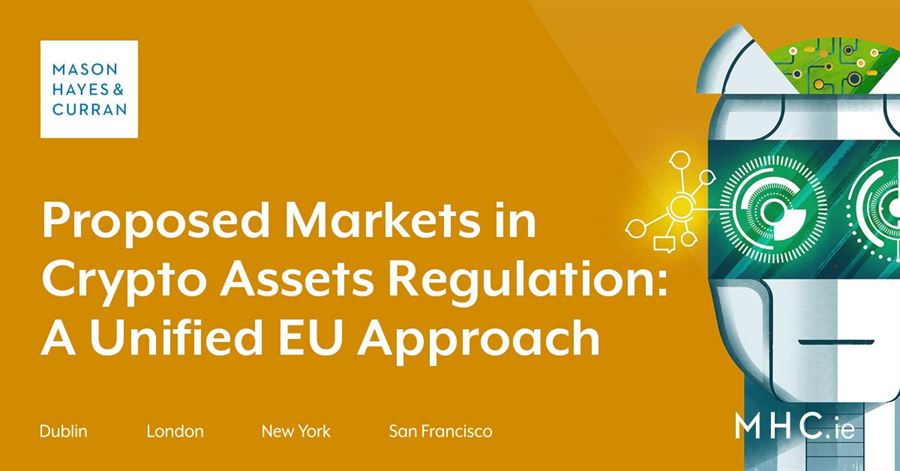Proposed Markets in Crypto Assets Regulation: A Unified EU Approachte

Background
The European Commission (EC) adopted the Digital Finance Package. This new regulatory framework includes a new legislative proposal on crypto-assets called the Markets in Crypto-assets Regulation (MiCA).
In Ireland, crypto-assets and crypto-providers are not subject to any specific regulatory regime other than the requirement on Virtual Asset Service Providers (VASPS). VASPS are required to comply with AML legislation and to complete an AML registration with the Central Bank of Ireland. See further detail here. The MiCA proposal is a new regulatory framework that seeks to regulate crypto-assets in a unified way across the EU and will apply directly to Ireland.
The Objectives of MiCA
MiCA has 4 broad objectives:
• To provide legal certainty for crypto-assets not covered by existing EU financial services legislation
• To establish uniform rules for crypto-asset service providers and issuers at EU level
• To replace existing national frameworks applicable to crypto-assets not covered by existing EU financial services legislation, and
• To establish specific rules for so-called ‘stablecoins’, including when these are considered electronic money
The Scope of MiCA
Crypto-asset Service Providers (CASPs) are defined under MiCA as “any person whose occupation or business is the provision of one or more crypto-asset services to third parties on a professional basis.”
Under MiCA, Crypto-asset services means any of the services and activities relating to any crypto-asset:
• The custody and administration of crypto-assets on behalf of third parties
• The operation of a trading platform for crypto-assets
• The exchange of crypto-assets for fiat currency that is legal tender
• The exchange of crypto-assets for other crypto-assets
• The execution of orders for crypto-assets on behalf of third parties
• The placing of crypto-assets
• The reception and transmission of orders for crypto-assets on behalf of third parties, and
• Providing advice on crypto-assets
MiCA defines a crypto-asset as a “digital representation of value or rights which may be transferred and stored electronically, using distributed ledger technology or similar technology”. MiCA broadly encompasses three crypto-asset types:
• Utility tokens: These are issued with non-financial purposes to digitally provide access to an application, services or resources available on Distributed Ledger Technology networks
• Asset-referenced tokens: These aim to maintain a stable value by “referencing several currencies that are legal tender, one or several commodities, one or several crypto-assets, or a basket of such assets”, and
• e-money tokens: These are crypto-assets with a stable value based on only one fiat currency that aims to function similarly to electronic money
The Regulatory Requirements
CASPs will be required to apply to their relevant state regulator to obtain a MiCA licence in order to provide any crypto-asset services. MiCA also seeks to introduce new rules for CASPs in relation to minimum capital requirements. Issuers of all MiCA crypto-assets must publish a whitepaper, similar to a fund prospectus, in relation to the specific crypto-assets that they provide services for. This is subject to certain exemptions.
There is no definitive timeline for MiCA’s full implementation. However, the EC expects the finalised Regulation will be implemented across all EU Member States by 2024.
Conclusion
The EC is actively in the process of introducing a unified regulatory regime for crypto-assets and CASPs across the EU. This approach is to be welcomed and should bring about much needed certainty on the status and regulatory rules for crypto-assets in Ireland.
While there is now a clear direction of travel for this new regulatory regime, there are still a number of details that will need to be developed throughout the rest of this year and 2022. We will continue to provide updates on MiCA as it makes its way through the European legislative process.
For more information, contact a member of our Technology Law team.
The content of this article is provided for information purposes only and does not constitute legal or other advice.
Share this:




